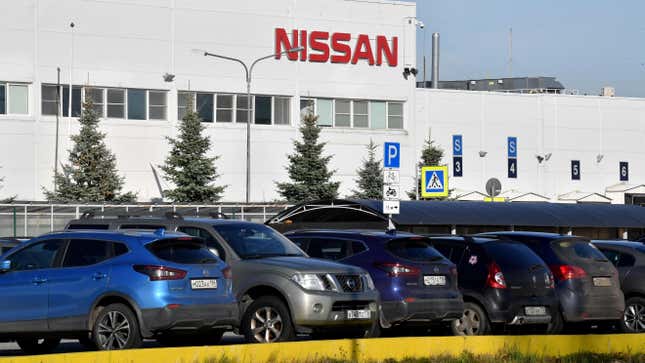
In a brief release on Tuesday, Nissan, which up until March of this year manufactured cars in Russia, said that they were giving up on it and exiting Russia. Nissan also said it would be selling its Russia business for one Euro, which is currently worth 98 cents. In its release, Nissan says the loss it is taking is “extraordinary,” no less than four times, which is accounting-speak for “sorry everyone this is a weird one.”
Reuters says that the loss will, in real terms, be around $687 million. Reuters also says that NAMI, which is buying Nissan’s Russia business, is state-owned by Russia.
Quoth Nissan’s release on the matter:
Nissan Motor Co., Ltd. (the “Company”) hereby announces that it has decided to exit from the Russian market and transfer all shares of Nissan Manufacturing Russia LLC (“NMGR”), a subsidiary of the Company, to the Central Research and Development Automobile Engine Institute (“NAMI”).
The Company and NMGR suspended production at its plant in St. Petersberg in March 2022, due to supply chain disruptions. Since then, the Company and NMGR have been monitoring the situation closely, but there is no visibility of external environment changing. For this reason, the Company has decided to transfer all its shares in NMGR to NAMI and exit from Russian market.
[...]
The Company expects to incur an extraordinary loss of approximately 100 billion yen from the transfer of NMGR shares to NAMI. The extraordinary loss includes the loss on transfer of receivables from NMGR, the loss on reversal of currency translation adjustments, and other items. The extraordinary loss figure is a forecast based on current exchange rate, and is subject to change. The Company has maintained its financial forecast for the fiscal year ending March 31, 2023.
The price of one euro is actually much more than Renault got when it sold its stake in AvtoVAZ; Reuters says that Renault got all of one ruble for it, or less than two cents. Both moves, surely, were made with an eye toward preventing future losses, though I appreciate the added drama of selling an entire slice of one’s business for virtually nothing. I also wonder how highly the people at Nissan and Renault who are paid to think about such things rated the chances of this ever happening, before it actually did.